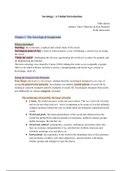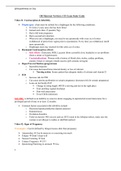Samenvatting
Summary Sociology: A Global Introduction (Chapters 1, 2, 4, 5, 6, 7, 8, 9, 10, 11 & 12)
- Instelling
- Erasmus Universiteit Rotterdam (EUR)
- Boek
- Sociology
Summary of Macionis & Plummers book 'Sociology: A Global Introduction'. I wrote this summary for the course Key Concepts in the Social Sciences, a mandatory course during Bachelor 1. This summary includes chapters 1, 2, 4, 5, 6, 7, 8, 9, 10, 11 & 12.
[Meer zien]






